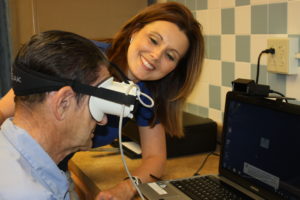Balance Recovery Program
 Loss of balance is a serious problem, especially for folks over the age of 60. In fact, one in three people age 65 and older fall each year, with ten percent of those falls causing serious injury. Worse yet, one-third of those seriously hurt die within a year, 40 percent need a nursing home, and half who make it to rehab never walk unaided again.
Loss of balance is a serious problem, especially for folks over the age of 60. In fact, one in three people age 65 and older fall each year, with ten percent of those falls causing serious injury. Worse yet, one-third of those seriously hurt die within a year, 40 percent need a nursing home, and half who make it to rehab never walk unaided again.
The program isn't just for older people. Falls are the #1 cause of nonfatal injuries in all age groups. Physicians often notice when an individual falls frequently, even if there are no serious injuries, there is a heightened fear of falling. This is usually accompanied by a loss of confidence or self-efficacy in their ability to move around. In most cases, the tendency is then to limit daily activities, which has the domino effect of reducing physical exercise and at the same time leads to an increase in social isolation. The net effect is that the self-imposed restrictions on activity can lead to an increased risk of falling and greater dependency on family members to help perform daily activities.
Anyone who has feelings of dizziness, lightheadedness, or unsteadiness, or suffers from a vestibular disorder, various types of inner ear disease, motion sickness, a disorder of the central nervous system, or visual system disease, could benefit from balance therapy. All patients need to have an order from their doctor.
Dizziness is an issue that should be addressed in some patients. Only about half of the people who complain of dizziness are properly diagnosed, and about 70 percent of such patients get a prescription for Meclizine (Antivert), which slows down reaction time equal to a blood alcohol level of .04 to .06 (reduced reaction time is a leading cause of falls in the elderly).
Based in Fairfield Memorial Hospital’s Therapy Services Department, the Balance Recovery Program is utilizing Balance+Plus technology.
The Balance+Plus Fall Assessment System allows for detection of a person's fall-risk by way of a posturography test. The equipment looks like a weight scale, but with computerized accessories.
If it becomes clear from the posturography test that the patient has a serious risk of falling an individualized balance recovery program is initiated.

